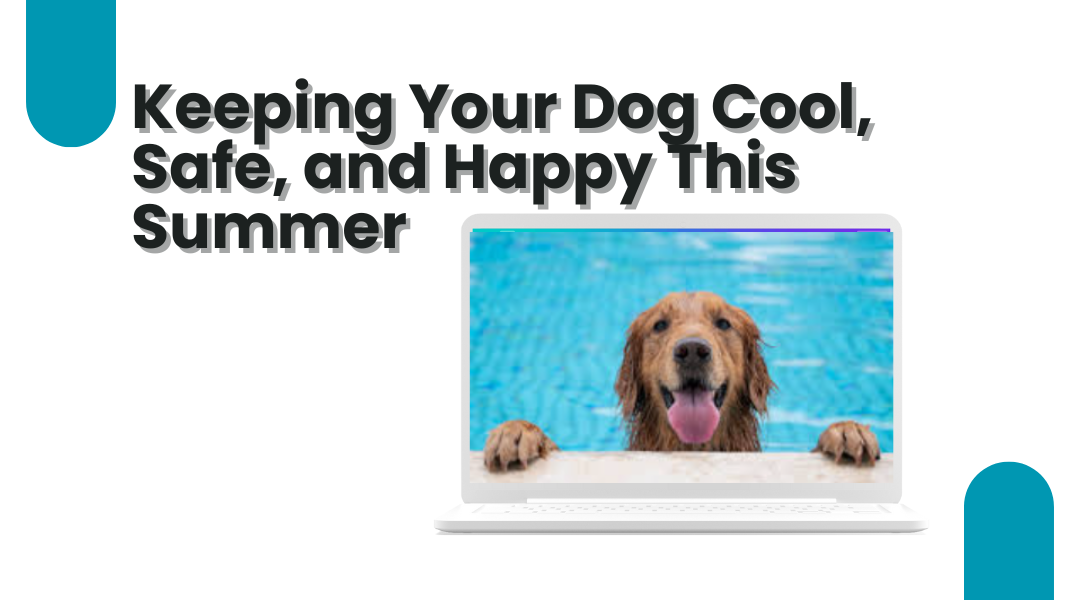Summer means backyard barbecues, lazy beach days, and ice cream—but for our dogs, the season brings hidden dangers. Unlike us, they can’t sweat it out or grab a cold drink when they’re overheating. A few smart precautions can mean the difference between a fun summer and a trip to the emergency vet.
Here’s how to protect your pup when the mercury rises.
Heatstroke: The Silent Killer
Dogs overheat fast—especially bulldogs, pugs, and thick-coated breeds like huskies.
Watch for:
- Panting like they’ve just run a marathon (when they haven’t)
- Bright red gums or a tongue that lolls sideways
- Stumbling like they’re drunk or collapsing
What to do:
- Get them out of the heat—into shade or AC immediately.
- Cool them down slowly: Use room-temperature water on their belly and paw pads (ice water can shock their system).
- Offer tiny sips of water, but don’t let them gulp—it could trigger vomiting.
- Call your vet, even if they seem better. Heatstroke damages organs silently.
Prevention:
- Walk at dawn or dusk—asphalt burns paws at midday.
- Hydrate like it’s your job: Bring a collapsible bowl on outings.
- Never leave them in a car. Cracked windows don’t help—temps soar to deadly levels in minutes.
Paw Protection: Don’t Let the Ground Grill Their Feet
That sidewalk might not feel scorching to your sandals, but your dog’s paws are bare skin.
Test it: Press your palm to the pavement for 7 seconds. If it’s uncomfortable for you, it’s burning them.
If paws get burned:
- Rinse with cool water.
- Apply a pet-safe antiseptic (like diluted chlorhexidine).
- Skip the walk—let them rest on soft surfaces.
Pro tip: Musher’s Secret wax creates a protective barrier for urban dogs.
Water Safety: Not All Dogs Are Natural Swimmers
That viral video of a golden retriever paddleboarding? Cute, but not every dog is built for the lake.
For water play:
- Life jackets are a must for breeds with short legs (dachshunds) or heavy chests (bulldogs).
- Rinse off after swimming—pool chlorine and lake bacteria irritate skin.
- Watch for exhaustion. Even strong swimmers tire quickly in heat.
No lake nearby? A kiddie pool in the shade with a few inches of water keeps small dogs cool.
Bug Wars: Ticks, Fleas, and Mosquitoes
Summer is all-you-can-eat season for parasites.
Defense tactics:
- Chewable preventatives (like NexGard or Simparica) beat messy topical treatments.
- Post-walk checks: Run your hands through their fur, especially under collars and between toes.
- Mosquito alert: Heartworm meds are non-negotiable in summer—one bite from an infected mosquito can be deadly.
Grooming: More Than Just a Pretty Coat
Shaving your double-coated dog (think: German shepherds, golden retrievers) is a mistake. Their undercoat insulates against heat.
Summer haircare:
- Brush daily to remove dead fur and improve airflow.
- Trim long hair around paws and belly for comfort.
- Bathe sparingly—overwashing strips protective oils.
For white or thin-coated dogs: Dog-safe sunscreen on ears and noses prevents burns.
Summer Snack Hazards
That burger you’re grilling? A potential ER visit for your dog.
Avoid:
- Corn cobs (intestinal blockages)
- Grapes and raisins (kidney failure)
- Onions/garlic (toxic to red blood cells)
Safe treats: Frozen blueberries, watermelon (seedless!), or pupsicles (blend yogurt and peanut freeze in ice cube trays).
When to Panic (and When Not To)
Normal summer behavior:
- Slightly more panting in heat
- Napping in cool spots (hello, bathroom tiles)
Vet-worthy red flags:
- Panting that doesn’t slow down in shade
- Vomiting or diarrhea with lethargy
- Seizures or loss of coordination
Final Thought: Summer should be about play, not panic. A little foresight—keeping water handy, avoiding peak heat, and knowing the danger signs—means you and your pup can enjoy those long, lazy days safely.
